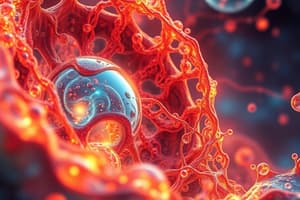Podcast
Questions and Answers
Who is known as the 'Father of Microbiology'?
Who is known as the 'Father of Microbiology'?
- Anton Van Leeuwenhoek (correct)
- Gregor Mendel
- Louis Pasteur
- Robert Hooke
Which of the following is NOT one of the principles of the Cell Theory?
Which of the following is NOT one of the principles of the Cell Theory?
- All existing cells are produced by other living cells.
- The cell is the most basic unit of life.
- Cell membranes are impermeable. (correct)
- All organisms are made of cells.
What type of cells lack a membrane-bound nucleus?
What type of cells lack a membrane-bound nucleus?
- Plant cells
- Animal cells
- Prokaryotic cells (correct)
- Eukaryotic cells
Which structure is primarily responsible for providing support and shape to cells?
Which structure is primarily responsible for providing support and shape to cells?
Which scientist introduced the term 'cell' while studying cork cells?
Which scientist introduced the term 'cell' while studying cork cells?
What is a distinctive feature of eukaryotic cells?
What is a distinctive feature of eukaryotic cells?
Which of the following functions is NOT associated with the cytoskeleton?
Which of the following functions is NOT associated with the cytoskeleton?
What characteristic do all cells share?
What characteristic do all cells share?
Which cellular feature is characteristic of prokaryotic cells?
Which cellular feature is characteristic of prokaryotic cells?
Flashcards are hidden until you start studying
Study Notes
Key Figures in Cell Biology
- Robert Hooke, a philosopher during the scientific revolution, is known as the "Father of Microscopy" for his contributions to the microscope's development.
- Hooke coined the term "cell" after observing cork cells, linking them to a monk's room in a monastery.
- Anton Van Leeuwenhoek enhanced microscope technology and is regarded as the "Father of Microbiology"; he was the first to discover microorganisms, which he referred to as "animalcules."
Cell Theory
- Developed by scientists Schleiden and Schwann, the Cell Theory presents three fundamental principles:
- All living organisms are composed of one or more cells.
- New cells arise only from pre-existing living cells.
- The cell is the basic unit of life.
Characteristics of Cells
- Cells exhibit certain common characteristics:
- Generally microscopic in size.
- Enclosed by a cell membrane.
- Contains cytoplasm.
- Two main types of cells exist:
- Eukaryotic cells, which contain a nucleus.
- Prokaryotic cells, which lack a nucleus and membrane-bound organelles.
Eukaryotic vs. Prokaryotic Cells
- Eukaryotic Cells: Complex cells featuring a nucleus, organelles, a cell membrane, and cytoplasm.
- Prokaryotic Cells: Simpler cells lacking a nucleus; consist of only a cell membrane and cytoplasm.
Internal Structures of Cells
- Cells possess various internal structures essential for function:
- The cytoskeleton is critical for:
- Supporting and shaping cells.
- Positioning and transporting organelles.
- Providing structural strength.
- Assisting in cell division.
- Facilitating cell movement.
- The cytoskeleton is critical for:
Studying That Suits You
Use AI to generate personalized quizzes and flashcards to suit your learning preferences.




